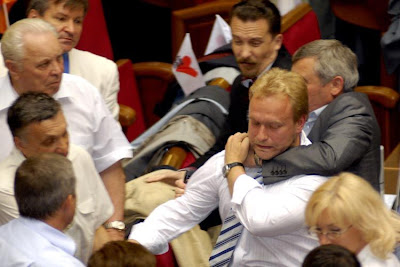
“If Putin says he’s against ‘Ukrainianization,’ you can translate that as meaning he opposes media freedom and real elections,” says Boris Nemtsov, a liberal politician.
He was reacting to Putin’s recent statement that ‘We must continuously think about improving our political system… but we must act with extreme caution [and] not allow our political culture to follow a Ukrainian scenario.”
According to Fred Weir’s piece in today’s Christian Science Monitor, which chronicled an unprecedented public disagreement between Putin and Medvedev over the direction of Russia’s democracy, ‘many in Russia’s liberal opposition community [believe that] Ukraine, for all its economic difficulties, is one of the few post-Soviet states that still enjoys competitive democracy, including press freedom and open, combative election campaigns’.
That view of the country’s politics might come as a surprise to the actual citizens of Ukraine, where ‘political infighting, corruption, government deadlock and economic recession brought the country to a standstill’ since 2004 and where, according to the Global Post, ‘representative government itself is viewed by many as the root of the problems’.
Ukrainian disillusionment with its brand of democracy comes across clearly in a recent authoritative report from the Pew Research Center, where Ukrainians’ assessment of the change to democracy started out at 77% in 1991 (the highest of any republic save the Baltics) but fell to 30% by 2009 – the lowest of any post-Soviet state.
Russia’s view of its transition, incidentally, fell only 8%, from 61% to 53% favourable.
Yes, Russia needs deep political reform and democratisation. But the liberal opposition will win themselves few votes by suggesting politcally crippled Ukraine as a model worthy of emulation.